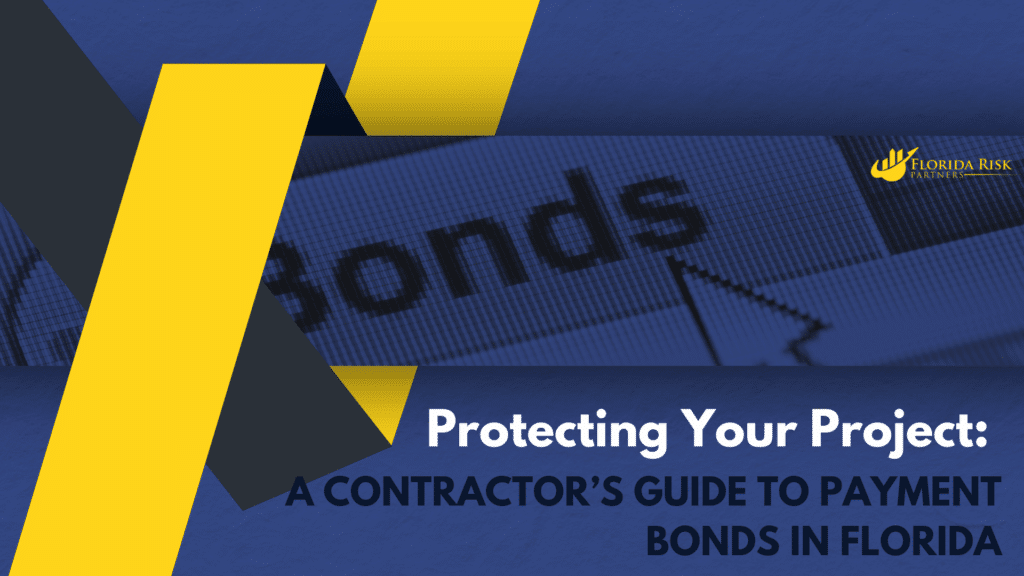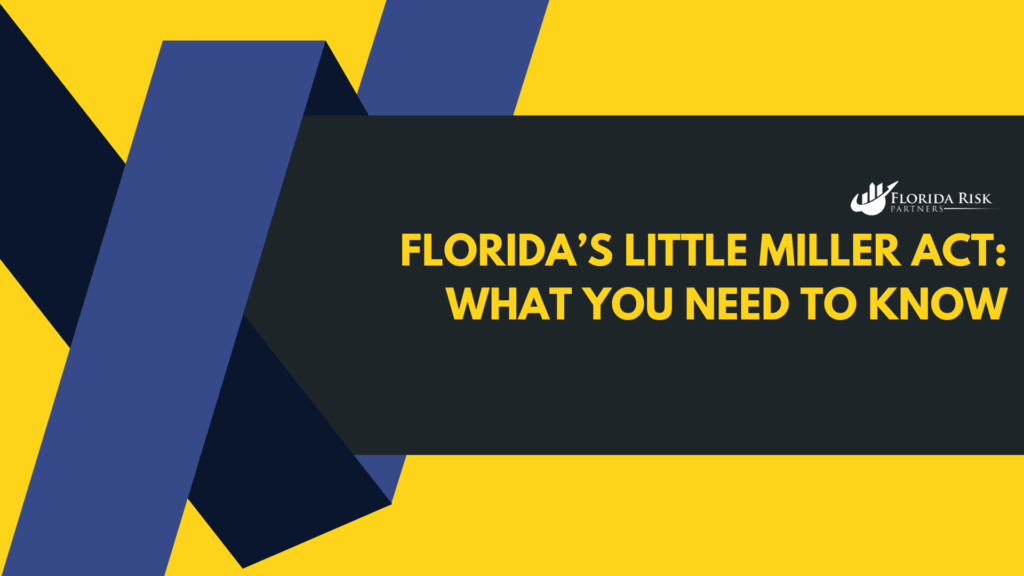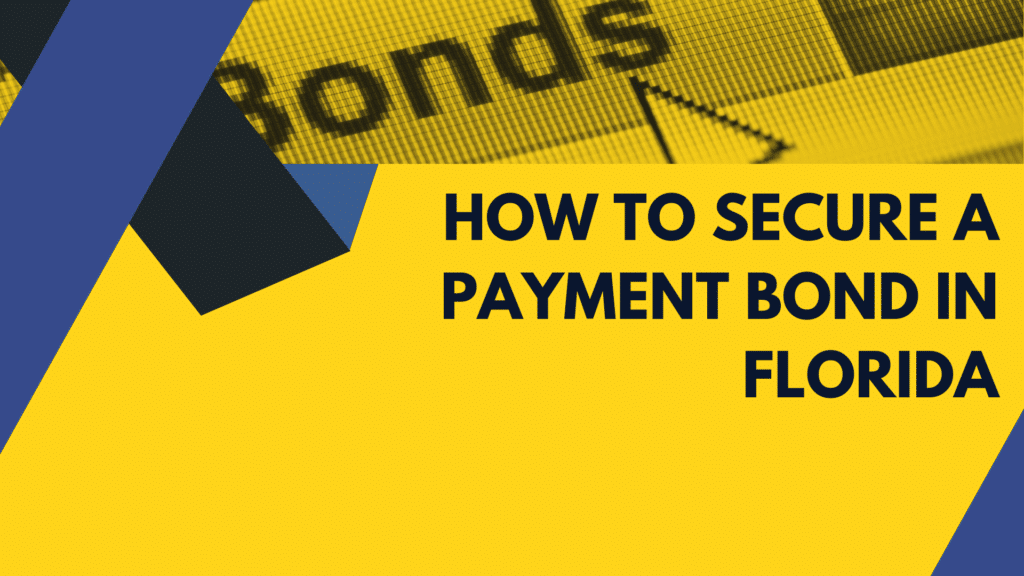-
Main Office: 1434 E. Bloomingdale Ave Valrico, FL 33596-6110
-
Phone: (888) 601-6660
-
Email: info@floridariskpartners.com

In the construction world, every successful project depends on more than bricks and blueprints—it depends on trust. General contractors rely on subcontractors, subcontractors depend on suppliers, and everyone needs assurance that payment will follow once the work is completed. Payment bonds provide that assurance.
For contractors doing business in the state of Florida—especially those bidding on public projects—payment bonds are not only common, they’re often mandatory. These surety bonds in Florida provide a financial safety net for subcontractors, laborers, and suppliers, ensuring that everyone gets paid, even if the general contractor fails to meet their obligations.
In this blog, we walk you through everything Florida contractors need to know about payment bonds, including how they work, who they protect, when municipalities require them, and what laws govern them. We also provide practical advice for navigating the payment bond process quickly and confidently—especially when you use the 24/7 quote/bind/issue platform from Florida Risk Partners.
What Is a Payment Bond?
A payment bond is a type of surety bond that guarantees a contractor will pay all subcontractors, suppliers, and laborers associated with a project. If the contractor fails to pay, the injured parties can file a claim against the bond to recover their losses.
A payment bond is typically required in conjunction with a performance bond, which ensures the project is completed according to contract specifications. Together, these bonds form the foundation of financial protection for both the project owner and the people performing the work.
Payment bonds are three-party agreements between:
- Principal – The contractor who obtains the bond
- Obligee – The project owner (typically a government entity)
- Surety – The bonding company providing the financial guarantee
Who Needs a Payment Bond in Florida?
Most commonly, general contractors bidding on public construction projects in Florida are required to obtain payment bonds. This includes jobs for:
- Municipal buildings
- County infrastructure (roads, water, sewer)
- State facilities (schools, universities, prisons)
- Federal projects (military bases, VA hospitals)
In Florida, public agencies require payment bonds on most construction contracts exceeding $100,000, per the Florida “Little Miller Act” (F.S. 255.05). This statute mirrors the federal Miller Act and sets forth specific requirements for payment and performance bonding on public works.
Payment bonds may also be required on private construction projects, especially large commercial developments, when the project owner wants to ensure suppliers and subcontractors are protected.
Florida’s Little Miller Act: What You Need to Know

The Florida Little Miller Act is a critical piece of legislation for contractors operating in the public sector. Here are the key highlights:
- Payment bonds are required for public construction contracts exceeding $100,000.
- The bond must be issued by a licensed surety company authorized to do business in Florida.
- The bond amount must be 100% of the contract value unless reduced by written authorization.
- Subcontractors, suppliers, and laborers can file claims directly against the bond if they are unpaid.
- Claimants must serve notice of non-payment within 45 days of first furnishing labor or materials, unless in direct contract with the prime contractor.
- A lawsuit must be filed within one year of the last provision of labor or materials.
Failure to obtain a proper payment bond can leave a contractor non-compliant with state law and ineligible to perform public work in the future.
Why Are Payment Bonds So Important?
From a subcontractor’s point of view, payment bonds are a critical safety net. On public projects, mechanics’ liens are not allowed, so the payment bond serves as the only recourse if the GC fails to pay.
From a contractor’s perspective, payment bonds serve to:
- Protect relationships – Suppliers and subcontractors are more likely to work with bonded contractors.
- Satisfy legal requirements – Without a payment bond, you may be disqualified from public bids.
- Mitigate disputes – Clear bonding procedures reduce conflicts over missed payments.
- Reinforce your reputation – Being bonded shows professionalism and financial responsibility.
Simply put, payment bonds create a climate of trust that keeps Florida’s construction economy moving.
What Does a Payment Bond Cover?
A Florida payment bond typically covers:
- Subcontractors
- Material suppliers
- Equipment lessors
- Laborers
- Consultants providing site-specific services
The bond ensures these parties are paid for:
- Labor performed
- Materials supplied
- Equipment rented
- Professional services related to construction
However, payment bonds do not cover indirect damages like delay claims or breach of contract claims. Their focus is strictly on ensuring payment for work and materials that contribute directly to the improvement of the property.
What Happens If You Don’t Have a Payment Bond?
Failing to provide a required payment bond on a public job in Florida can result in:
- Bid rejection or contract termination
- Legal liability if subcontractors or suppliers go unpaid
- Loss of bonding capacity or difficulty getting bonded in the future
- Damage to reputation within the construction community and with public agencies
Even on private jobs, not having a payment bond can mean fewer subcontractor bids, higher supplier pricing (due to perceived risk), and disputes that lead to project delays or litigation.
Bottom line? In Florida’s competitive environment, being bonded makes you more attractive to both project owners and trade partners.
How to Secure a Payment Bond in Florida
Getting a payment bond involves several steps. Here’s a quick overview of the process when working with Florida Risk Partners:
1. Establish a Bonding Relationship
You’ll need to provide:
- Business and personal financial statements
- Project experience and references
- Resumes for key personnel
- A completed contractor questionnaire
- Bank references
Our team will help you establish a surety line of credit, which can be used to issue payment and performance bonds quickly as projects arise.

2. Review the Project Requirements
Each project will have its own bonding specs. Be sure to verify:
- Required bond amount (usually 100% of the contract)
- Deadline for bond submission
- Specific forms or language required by the agency
3. Request the Bond
Once the project is approved, we can issue your bond through our online quote/bind/issue platform, available 24/7. This means you can respond to tight bid windows and last-minute award notices—even after hours or on weekends.
How Florida Risk Partners Simplifies Payment Bonding
At Florida Risk Partners, we understand that the bonding process can be frustrating and time-consuming—especially when your team is focused on winning bids and managing jobs. That’s why we’ve built a system specifically for Florida contractors who want a faster, simpler way to stay compliant.
Our clients benefit from:
- 24/7 access to our digital bonding platform
- Fast-track underwriting for experienced contractors
- Local knowledge of Florida’s bonding laws and agency requirements
- Multi-project bonding capacity for contractors managing several jobs
- Personalized support from a team that speaks “construction fluently”
Whether you’re bidding a new city hall in Tallahassee or a school renovation in Fort Myers, we help you get the bonds you need—on your schedule, without the hassle.
Common Challenges with Payment Bonds (and How to Overcome Them)
Even experienced contractors can face roadblocks when dealing with payment bonds. Here are a few common issues and how to avoid them:
Problem: Financials Not Up to Date
Sureties require current financial information to issue bonds. If your books are outdated, approval may be delayed.
Solution: Work with your CPA to provide quarterly or monthly updates and keep your balance sheet bond-ready.
Problem: Job Size Exceeds Bond Line
If the contract value is higher than your approved bond capacity, you may be declined.
Solution: Plan ahead. Let us know about large jobs in advance so we can secure additional bonding capacity before the bid date.
Problem: Project Owner Requires a Proprietary Bond Form
Some agencies use specific bond forms that your surety may not have on file.
Solution: Send the bond form to us early. We’ll coordinate with the surety to get it approved before submission.
Conclusion: Make Payment Bonding a Competitive Advantage
In Florida, where construction is booming and opportunities abound, payment bonds are a cornerstone of successful project execution. They protect your partners, satisfy legal requirements, and elevate your standing in the marketplace.
But more than that, they position you as a trustworthy, capable contractor—someone who does what they say and pays who they owe. That kind of reputation opens doors and wins contracts.
At Florida Risk Partners, we make payment bonding fast, easy, and accessible. Our 24/7 platform, expert support, and commitment to Florida contractors means you’ll never have to scramble at the last minute or wonder if your bond is in place.
So the next time you’re lining up a big public job—or looking to solidify trust with your subcontractors—remember this: A payment bond isn’t just a requirement. It’s a resource. Let us help you use it to your advantage.
Call Us Or
Schedule an Appointment
Select an agent below to view our online calendars and select a day and time that works best for you or call us directly at 888-601-6660. When you use our online calendars, you will receive an email with more information.



